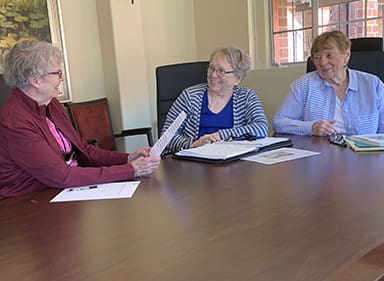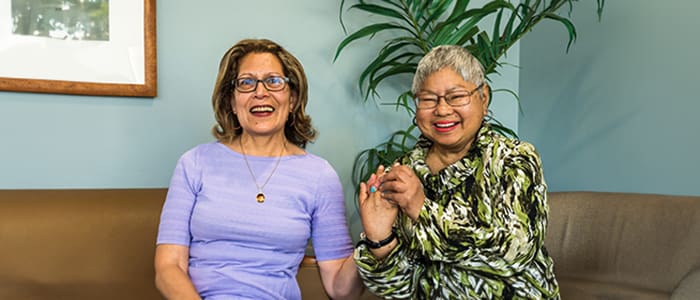May 31, 2023
Claremont Manor Writers Group Supports Resident Storytellers
As enjoyable and fulfilling as writing can be, it’s often a solitary endeavor. While some may romanticize the focused artist typing away while imaginary worlds and narratives swirl inside their minds — authors know, writing can get lonely.
But at Claremont Manor, it doesn’t have to be. About a dozen writers from all skill levels come together each week to provide inspiration and encouragement to one another. They do so under the guidance of resident Millie Hinkle, a published author, teacher, cheerleader, sounding board and founder of the Claremont Manor Writers Group.

Martha Stephenson, center, and Millie Hinkle.
“Everyone has a story to tell, but the biggest road block to writing is self-confidence,” Millie said. “People don’t think their stories are worth telling but they are. These are stories in their hearts that need to be written. My job is to help them move what they have in their heads to paper.”
Millie is the author “26 Bible Stories You May Not Know,” and co-author of “Windows,” a collection of short stories about new beginnings, love, pain, and enduring strength — two books she wrote later in her life.
“When I was younger I always felt I was unheard,” Millie said, who spent most of her younger years taking care of her home and family. “I was a late bloomer. I decided to go back to school and get my bachelor’s degree at age 50 and my master’s degree in technical and expository writing at age 70. Now, I love sharing my knowledge with my friends.”
Millie remembers as a young girl listening to her mother tell stories about their family. “They were stories that made our life so rich and I always wanted to write those stories down.”
One of Millie’s first stories was about a family trauma involving her son and how a shaving cream pie made her and her husband laugh and relieve the stress between them. Millie said writing communities are the perfect place to find answers to writing questions and to discuss the ins and outs of the writing with people who actually understand the process. Millie teaches two classes, one for beginning writers who want to know the fundamentals and one for more seasoned writers who want to perfect their craft among their peers.
Stories take on many forms – some fiction and some nonfiction. Among recent anecdotes are reflections of a 10-year-old about the attack on Pearl Harbor. Another resident wrote about a semi-autobiographical account of a very memorable Christmas with her family. A retired federal judge wrote about how, as a child, his mother’s innocent fib during a family move made him switch from playing the drums to the guitar, and another resident’s whimsical tale describes an average day at home – from the perspective of her cat!
Millie typically asks beginning writers to start by writing a short paragraph about any topic, not worrying about spelling, punctuation or grammar. “You have to start somewhere,” Millie said. “It’s important that they just get something down. They can build from there.”
Millie then introduces them to a process she developed. She helps writers organize their thoughts, understand their audience and sometimes suggests creating a visual diagram of what they want to include in their stories.
“I start with people where they are,” Millie said. “All skill levels are welcome. Writing is definitely a process. “I help them through that process.”
“I think Millie is one of the best teachers I’ve ever had,” said Martha Stephenson, a retired teacher and administrator. “Millie has a way of looking at a story and making it better. She suggested to me that instead of describing a day with my cat, that I rewrite it from the perspective of the cat. I love writing humorous stories and this one came out great.”
During a recent class, resident Jean Whitaker, read her story aloud about a memorable family Christmas. She beautifully described the father in the story but did not do the same for the mother and daughter. Millie pointed that out and Jean was grateful for the suggestion.
“That was good advice,” Jean said. “My second draft will give more personality to the other characters. My mother was a writer and she wrote stories about her childhood. I think it’s important to keep those stories alive for future generations, so I’m doing my part.”
The Writers Group recently presented some of their stories to a standing-room-only crowd of about 70 in Manor Hall. “Everyone listened intently so I think it was a success,” Millie said.
And one thing Millie likes to point out is that in addition to being a writing teacher, she is also a student. “I present my stories to the group as well and I welcome their comments and constructive criticism.”
Her dream is to publish a collection of the Writers Group’s stories for all to enjoy.






